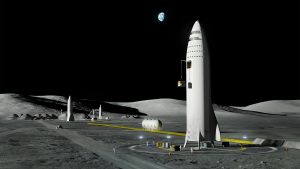 SpaceX founder and CEO Elon Musk stunned the world with his announcement at the company’s headquarters in California in September this year. Addressing a packed audience of journalists who had assembled at the site, he made the much-awaited announcement of the private space tourist, who is to go for a round trip around the moon.
SpaceX founder and CEO Elon Musk stunned the world with his announcement at the company’s headquarters in California in September this year. Addressing a packed audience of journalists who had assembled at the site, he made the much-awaited announcement of the private space tourist, who is to go for a round trip around the moon.
Musk introduced the Japanese entrepreneur, Yusaku Maezawa, a billionaire and globally renowned art collector, going to be the first private space tourist to board the BFR (Big Falcon Rocket) for a joyride around the moon. The trip is slated to take place in 2023, and the spaceflight around the moon and back may last for 4 to 5 days.
The BFR spaceship is 118 metres tall, 9 metres in diameter, capable of taking 100 passengers to the moon and beyond. The massive rocket is powered by 7 Raptor engines; the earlier design had envisioned a total of 6 engines.
“BFR is intended as an inter-planetary transport system that is capable of getting from earth to anywhere in the solar system,” Musk told the journalists during his address.
Elucidating the role of SpaceX, Musk further said, “The reason for creating SpaceX was to accelerate the advent of humanity becoming a space-faring civilization, to help advance rocket technology to a point where we could potentially become a multi-planet species and a true space-faring civilization.”
Yusaku Maezawa who chose to fund the rocket told the audience that he had been dreaming of flying to the moon and as a child the ‘moon filled his imagination.’ He expressed his plans to take a handful of artists from around the world along with him for free.
Musk has been in the news since he outlaid his plans for colonization of Mars, and how the SpaceX he founded was working to create a space transportation system that will make space travel cheaper and safer. He has been vocal about his interests to help advance the human race to the solar system and beyond. SpaceX has been extremely successful as a private space organisation, giving a tough competition to even the big players like Boeing and Lockheed Martin.
The foray of private players in the space exploration has increased the stakes of space travel by encouraging renewed research and development of space transportation amongst organisations. It has helped to break the barriers of miniscule funding by governments and create avenues for greater participation by scientists and corporations alike. The privatisation era will be a boon for the space industry and the chances of extending our civilisation beyond earth, as it will give a free market to explorers and investors to work together and help advance human interests to dream of interstellar travel.
With the shrinking NASA budget, the torch of space exploration has passed on to the private space players that seem overly enthused to embark on the challenge. Amazon Founder, Jeff Bezos, has his plans to colonise the moon through his little-known project Blue Origin. Richard Branson, through his Virgin Galactic, is aggressively pushing for space tourism, which he however intends to restrict to low earth orbit. Virgin Galactic has successfully tested its latest spacecraft after a few failures last year.
Humanity’s most groundbreaking progresses in space exploration have always been the result of some sort of competition. The Apollo Missions that took us to the moon in the 1969, and the later years, was a result of Cold War rivalry. This time around, it’s about commercial rivalry. Except this time, instead of the governments, it’s the private billionaires, fighting for a chunk in the evolving space travel market and the tremendous potential it holds in the future.
NASA on the other hand has its own ambitions. They plan to create a moon outpost, known as the Lunar Orbital Platform-Gateway — a moon-orbiting space station, intended as a deep space platform, besides enabling research and commercial experiments on the moon. The agency intends to start building the Gateway in the next half-decade. NASA, through SpaceX, Boeing and Lockheed Martin, is developing the space vehicles for the United States — one of them being the Orion space capsule, for launch on the Space Launch System (SLS). The space agency’s limited budgets have prevented it from building more spacecraft, capable of taking astronauts to the space. Even the means of launching the astronauts aboard the ISS are provided through Russia, using their Soyuz craft. After the US retired its space shuttle programme in 2011, there has almost been little to no progress to build more spacecraft, owing to the ever-shrinking space budget.
The global experts agree on the fact that if space exploration is to advance there has to be aggressive privatisation — since the governments can no longer take it. The budgets involved in space transportation are massive. Ironically, the defence and war budgets massively surpass those of space exploration, while in an ideal world, it should be the other way round. The world right now is involved in a series of wars and tensions, leading to staggering race for firepower, ever powerful defense and the most modern weapon systems. This is resulting in nations spending more and more on modernisation and upgradation of weapons, powering the armies and stockpiling weapons, whether by import or indigenously. Other areas, like space have therefore remained thirsty for funds, resulting in a stagnation-like situation for space agencies around the world.
Conclusively, in order for the humanity to advance its interests beyond the earth and get into space exploration, governments around the world will need to prioritise space research and innovation. Space travel needs far more attention than it’s getting from academicians, technologists, governments and organisations worldwide, and the people in general.
The fact that there has been no manned mission beyond the earth’s orbit since the 70s should force our governments to hang their heads in shame — for giving exploration and scientific advancement less importance than the wars, for ignoring the colossal and game-changing potential space travel holds for the humanity, and for ignoring possibilities that could transform the humankind beyond anyone’s imagination.
letters@tehelka.com













